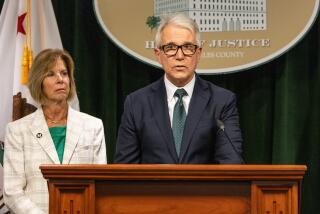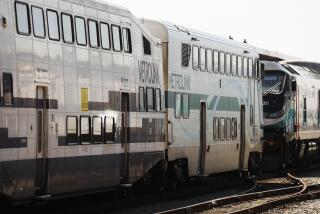Verdict in train wreck: murder
A Los Angeles jury convicted a 29-year-old Compton laborer of 11 counts of first-degree murder Thursday for triggering the deadliest Metrolink train crash in history when he parked his vehicle on railroad tracks three years ago and fled.
Juan Manuel Alvarez, who could face the death penalty, showed no emotion as the guilty verdicts were announced in a downtown courtroom. Behind him sat at least half a dozen relatives of people killed in the crash, including some who had attended much of the eight-week trial despite its sometimes graphic testimony.
Eleven people were killed and more than 180 were injured in the Jan. 26, 2005, wreck near Glendale when a southbound Metrolink passenger train smashed into Alvarez’s sport-utility vehicle, hit an idle freight train and crashed into an oncoming Metrolink train.
Alvarez testified that he never meant to hurt anyone but himself, describing his actions as an aborted suicide attempt. But prosecutors argued that Alvarez intentionally turned a peaceful early-morning commute into a scene of bloody carnage in a twisted attempt to get attention and win back the affections of his estranged wife.
The jury took little more than a day to convict Alvarez and also found him guilty of arson and a special circumstance allegation that makes him eligible for the death penalty. Jurors are expected to hear more testimony next month to determine whether he should be executed.
Several relatives of the victims expressed relief after the verdicts.
“He is a menace to society. He’s a sick person. He’s not sorry for any of this,” said Susan McKeown, whose husband, Scott, was among those killed. “I’m so relieved that I can go home tonight and tell my kids, ‘The man who killed your father is being punished.’ ”
Alberto Romero, 45, a machine shop supervisor from Rancho Cucamonga, embraced his cousin Henry as both men wept.
“Justice was served,” Romero said.
Metrolink trains run each day behind his machine shop in the city of Industry, Romero said, serving as a constant reminder of the crash that took his uncle’s life. He said life in prison would be a more significant punishment for Alvarez than death.
“He needs to think about it,” Romero said. “And he’s going to be amongst bad people too. I have a lot of hate inside.”
But Tony Tutino, whose brother James was killed aboard the train, said he believed Alvarez deserved the death penalty.
“If you make those decisions, you need to pay,” Tutino said.
On Wednesday, jurors sent a note to Los Angeles County Superior Court Judge William Pounders requesting “a more elaborate definition” of first-degree murder and malice; and they wanted to know whether premeditation had “any effect on deciding first-degree murder in this case.” At least two jurors also requested a visit to the site where the incident occurred, but withdrew their request Thursday, less than an hour before the panel reached a verdict.
Defense attorneys Thomas W. Kielty and Michael R. Belter, who were appointed to represent Alvarez, declined to comment.
Dist. Atty. Steve Cooley praised the work of Deputy Dist. Attys. John Monaghan and Cathryn Brougham, the Major Crimes Division prosecutors on the case.
“I am gratified with today’s verdicts,” Cooley said in a written statement.
Prosecutors had argued that on the morning of the crash, Alvarez doused his vehicle with gasoline and parked it on the tracks about half a mile south of downtown Glendale, hoping to cause a catastrophe.
Defense lawyers had insisted that the tragedy was an accident that occurred after Alvarez, a delusional methamphetamine addict, changed his mind about committing suicide. Alvarez testified that he tried, but failed, to get his vehicle off the tracks.
During five days of testimony, Alvarez apologized for causing the tragedy and asked for forgiveness from victims’ relatives. He told jurors that although he expected to be punished, he was “not a murderer.”
“It was an accident,” he testified, “a stupid mistake.”
The defense lawyers portrayed their client as a troubled but sympathetic man who had survived an abusive childhood. He had often tried to kill himself, they said.
Defense attorneys said that on the day of the wreck, Alvarez -- whom they described as a loving father of two small children -- snapped. He was upset over his wife getting a restraining order that prevented him from seeing his children. When he drove his SUV onto the tracks, Alvarez’s “single-minded purpose” was to commit suicide, the defense team argued.
But prosecutors depicted Alvarez as a manipulative liar who was violent and dangerous.
Under cross-examination, Alvarez acknowledged that he carried a knife and sometimes a machete. He also admitted that he had once pulled a knife on his cousin, thought about killing his wife and threatened to kill her over an alleged lover.
Prosecutors contended that Alvarez conducted “pretend” suicides as a way to draw sympathy and pity.
They argued that on the morning of the derailment, homicide, not suicide, was on Alvarez’s mind. Before he drove his vehicle onto the tracks, Alvarez acknowledged that he had thoughts about killing his wife at her job. But she was not at work at that time.
As a result, prosecutors argued, innocent Metrolink passengers bore the consequences of his wrath at his wife.
Teresa Nance, whose mother, Elizabeth Hill, was a crash victim, was perturbed that Alvarez showed no remorse while the verdict was being read. “He didn’t seem to care,” she said.
McKeown’s widow said the years since his death had been torture for her and her two children, 11 and 9.
A lifelong train buff, Scott McKeown often took his children on train rides from their home in Moorpark in Ventura County for lunch or just to have ice cream. The couple dreamed of Scott being able to earn enough money so that Susan could stay at home with their daughter and son. A week before the crash, Scott, a telecommunications manager for the city of Pasadena, finally got the raise they needed for her to quit her part-time job.
Nearly every day of the eight-week trial, tow truck driver Todd McKeown sat in the audience absorbing often painful evidence, including photographs of his brother’s body after the crash. A worker of long hours, he sometimes struggled to stay awake in court.
“It was devastating to see my brother, but I also knew I had to face it,” he said. “I had to face it. I had to be there. I couldn’t turn my back on any part of it.”
Metrolink spokeswoman Denise Tyrrell said her company shared in the family members’ grief.
“No matter what happens, we cannot look at this situation with anything but sadness,” she said. “Nothing is going to bring these 11 people back.”
Some crash survivors and victims’ families have sued Metrolink, contending that the agency could have minimized the damage by placing an engine at the front of the train rather than the back. Tyrrell said such a practice could have made the losses worse had diesel in an engine caught fire.
--
jack.leonard@latimes.com
More to Read
Sign up for Essential California
The most important California stories and recommendations in your inbox every morning.
You may occasionally receive promotional content from the Los Angeles Times.












